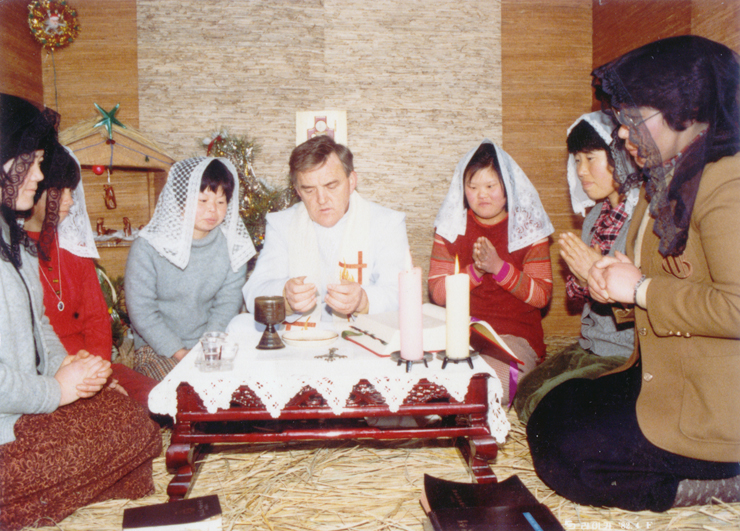Another Myeong Sek: The Road to Emmaus
By Fr Noel O’Neill
Columban Fr Noel O’Neill founded Emmaus Industries to help better the lives of the differently abled. He lives and works in South Korea.
Myeong Sek, Theresa, was special. She was special because she was differently abled.
Fr O’Neill with Myeong Sek
She was special because it was she who accompanied me as together we first began to walk the Road to Emmaus. After 25 years in parish ministry I sought permission from my superiors to begin a new apostolate, a ministry to persons with special needs.
With Myeong Sek at the grave of
You Ha
Myeong Sek had been abandoned by her parents when she was a few years old and ended up in ‘The Beggars Camp’, Mudeong Institution, which I frequently visited while in parish ministry. After much negotiation with the authorities there I succeeded in getting permission for Myeong Sek to leave and to join with me and a volunteer as we moved into a two-story house in a residential part of the city. It was October 1981. This was the first attempt in Korea of offering people with special needs the opportunity of living in the local community.
Myeong Sek’s funeral Mass
Myeong Sek’s funeral Mass
Early in 2012 Myeong Sek was diagnosed with cancer. She spent the last ten days of her life in a hospice. A hospice and Emmaus have something in common. A hospice is for people dying whose ailment cannot be cured. Emmaus is for intellectually disabled people whose disability cannot be cured. A visit to either one alerts us to the preciousness of each moment of life; it arouses within us a sense of gratitude.
While Myeong Sek was in the hospice I visited her every day. As I sat beside her bedside and held her tiny hand, we reminisced about the funny incidents we had shared together throughout the previous 30 years, the times we used to sing Kaptori Wa Kapsoni (a Korean popular duet) and dance the hokey pokey.
Kaptori Wa Kapsoni
As she laid back on her bed she would break into a broad smile, a loving smile, sending me a message that no words could express. They were happy moments, happy days, happy years.
That smile also hid the many wounds and hurts she had endured in her lifetime. I was only too well aware of those painful wounds. Watching the peaceful look on her face I felt she already sensed the heavenly welcome. She could almost make the dying words of St Thérèse, the Little Flower, her own: ‘I am not dying, I am entering into life’.
Myeong Sek was waked for three days at the funeral home. Those who had lived with her in the group home were dressed in mourning black dress, and they greeted those who came to pay their respects, present and former staff members who had known her for many years. Many Catholic friends and sponsors came who were touched and moved by their relationship with Myeong Sek. This tiny, fragile woman had the gift to make them feel loved and at peace with themselves as they struggled with their problems.
Myeong Sek often said, ‘When I die, those who come to the wake, feed them well’. They came in large numbers to pay their respects and all ate well. Before leaving as each one ate and departed you could almost sense the presence of Myeong Sek as she said kamsahamnida,’thank you, thank you’.
At the cemetery
The funeral Mass was held at the parish church Myeong Sekused to attend. Six priests concelebrated for a packed congregation. I chose for the Gospel the story of the two disciples on the Road to Emmaus. As the two disciples eyes were opened at seeing Jesus break the bread, so also my eyes were opened by my relationship with Myeong Sek. This tiny, fragile woman, who could not read or write, who had no concept of time or money, was my teacher, my professor. We need to invite and welcome more Myeong Seks into our society because they will surprise us with the manner they can touch our inner selves and help us to welcome our weaknesses, our old age with graceful and peaceful courage. Yes, Myeong Sek was differently abled.

Mass with the Emmaus Community, Myeong Sek in grey